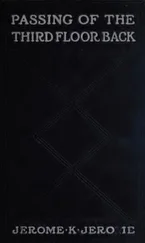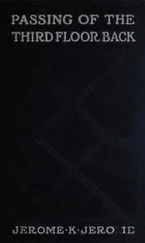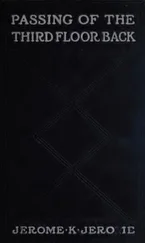Jerome Jerome - The Second Thoughts of an Idle Fellow
Здесь есть возможность читать онлайн «Jerome Jerome - The Second Thoughts of an Idle Fellow» — ознакомительный отрывок электронной книги совершенно бесплатно, а после прочтения отрывка купить полную версию. В некоторых случаях можно слушать аудио, скачать через торрент в формате fb2 и присутствует краткое содержание. Жанр: foreign_antique, foreign_prose, на английском языке. Описание произведения, (предисловие) а так же отзывы посетителей доступны на портале библиотеки ЛибКат.
- Название:The Second Thoughts of an Idle Fellow
- Автор:
- Жанр:
- Год:неизвестен
- ISBN:нет данных
- Рейтинг книги:5 / 5. Голосов: 1
-
Избранное:Добавить в избранное
- Отзывы:
-
Ваша оценка:
- 100
- 1
- 2
- 3
- 4
- 5
The Second Thoughts of an Idle Fellow: краткое содержание, описание и аннотация
Предлагаем к чтению аннотацию, описание, краткое содержание или предисловие (зависит от того, что написал сам автор книги «The Second Thoughts of an Idle Fellow»). Если вы не нашли необходимую информацию о книге — напишите в комментариях, мы постараемся отыскать её.
The Second Thoughts of an Idle Fellow — читать онлайн ознакомительный отрывок
Ниже представлен текст книги, разбитый по страницам. Система сохранения места последней прочитанной страницы, позволяет с удобством читать онлайн бесплатно книгу «The Second Thoughts of an Idle Fellow», без необходимости каждый раз заново искать на чём Вы остановились. Поставьте закладку, и сможете в любой момент перейти на страницу, на которой закончили чтение.
Интервал:
Закладка:
“Oh yes, it was clever,” I replied, “I am willing to admit that.”
“He made it out of some old beer barrels,” she continued; she seemed proud of it.
My resentment, though I tried to keep it under control, was mounting higher.
“Oh! did he?” I said; “I should have thought he might have found something better to do with them.”
“What?” she asked.
“Oh! well, many things,” I retorted. “He might have filled them again with beer.”
My hostess looked at me astonished. I felt some reason for my tone was expected.
“You see,” I explained, “it is not a well-made chair. These rockers are too short, and they are too curved, and one of them, if you notice, is higher than the other and of a smaller radius; the back is at too obtuse an angle. When it is occupied the centre of gravity becomes – ”
My hostess interrupted me.
“You have been sitting on it,” she said.
“Not for long,” I assured her.
Her tone changed. She became apologetic.
“I am so sorry,” she said. “It looks all right.”
“It does,” I agreed; “that is where the dear lad’s cleverness displays itself. Its appearance disarms suspicion. With judgment that chair might be made to serve a really useful purpose. There are mutual acquaintances of ours – I mention no names, you will know them – pompous, self-satisfied, superior persons who would be improved by that chair. If I were Willie I should disguise the mechanism with some artistic drapery, bait the thing with a couple of exceptionally inviting cushions, and employ it to inculcate modesty and diffidence. I defy any human being to get out of that chair, feeling as important as when he got into it. What the dear boy has done has been to construct an automatic exponent of the transitory nature of human greatness. As a moral agency that chair should prove a blessing in disguise.”
My hostess smiled feebly; more, I fear, from politeness than genuine enjoyment.
“I think you are too severe,” she said. “When you remember that the boy has never tried his hand at anything of the kind before, that he has no knowledge and no experience, it really is not so bad.”
Considering the matter from that point of view I was bound to concur. I did not like to suggest to her that before entering upon a difficult task it would be better for young men to acquire knowledge and experience: that is so unpopular a theory.
But the thing that The Amateur put in the front and foremost of its propaganda was the manufacture of household furniture out of egg-boxes. Why egg-boxes I have never been able to understand, but egg-boxes, according to the prescription of The Amateur , formed the foundation of household existence. With a sufficient supply of egg-boxes, and what The Amateur termed a “natural deftness,” no young couple need hesitate to face the furnishing problem. Three egg-boxes made a writing-table; on another egg-box you sat to write; your books were ranged in egg-boxes around you – and there was your study, complete.
For the dining-room two egg-boxes made an overmantel; four egg-boxes and a piece of looking-glass a sideboard; while six egg-boxes, with some wadding and a yard or so of cretonne, constituted a so-called “cosy corner.” About the “corner” there could be no possible doubt. You sat on a corner, you leant against a corner; whichever way you moved you struck a fresh corner. The “cosiness,” however, I deny. Egg-boxes I admit can be made useful; I am even prepared to imagine them ornamental; but “cosy,” no. I have sampled egg-boxes in many shapes. I speak of years ago, when the world and we were younger, when our fortune was the Future; secure in which, we hesitated not to set up house upon incomes folks with lesser expectations might have deemed insufficient. Under such circumstances, the sole alternative to the egg-box, or similar school of furniture, would have been the strictly classical, consisting of a doorway joined to architectural proportions.
I have from Saturday to Monday, as honoured guest, hung my clothes in egg-boxes.
I have sat on an egg-box at an egg-box to take my dish of tea. I have made love on egg-boxes. – Aye, and to feel again the blood running through my veins as then it ran, I would be content to sit only on egg-boxes till the time should come when I could be buried in an egg-box, with an egg-box reared above me as tombstone. – I have spent many an evening on an egg-box; I have gone to bed in egg-boxes. They have their points – I am intending no pun – but to claim for them cosiness would be but to deceive.
How quaint they were, those home-made rooms! They rise out of the shadows and shape themselves again before my eyes. I see the knobbly sofa; the easy-chairs that might have been designed by the Grand Inquisitor himself; the dented settle that was a bed by night; the few blue plates, purchased in the slums off Wardour Street; the enamelled stool to which one always stuck; the mirror framed in silk; the two Japanese fans crossed beneath each cheap engraving; the piano cloth embroidered in peacock’s feathers by Annie’s sister; the tea-cloth worked by Cousin Jenny. We dreamt, sitting on those egg-boxes – for we were young ladies and gentlemen with artistic taste – of the days when we would eat in Chippendale dining-rooms; sip our coffee in Louis Quatorze drawing-rooms; and be happy. Well, we have got on, some of us, since then, as Mr. Bumpus used to say; and I notice, when on visits, that some of us have contrived so that we do sit on Chippendale chairs, at Sheraton dining-tables, and are warmed from Adam’s fireplaces; but, ah me, where are the dreams, the hopes, the enthusiasms that clung like the scent of a March morning about those gim-crack second floors? In the dustbin, I fear, with the cretonne-covered egg-boxes and the penny fans. Fate is so terribly even-handed. As she gives she ever takes away. She flung us a few shillings and hope, where now she doles us out pounds and fears. Why did not we know how happy we were, sitting crowned with sweet conceit upon our egg-box thrones?
Yes, Dick, you have climbed well. You edit a great newspaper. You spread abroad the message – well, the message that Sir Joseph Goldbug, your proprietor, instructs you to spread abroad. You teach mankind the lessons that Sir Joseph Goldbug wishes them to learn. They say he is to have a peerage next year. I am sure he has earned it; and perhaps there may be a knighthood for you, Dick.
Tom, you are getting on now. You have abandoned those unsaleable allegories. What rich art patron cares to be told continually by his own walls that Midas had ass’s ears; that Lazarus sits ever at the gate? You paint portraits now, and everybody tells me you are the coming man. That “Impression” of old Lady Jezebel was really wonderful. The woman looks quite handsome, and yet it is her ladyship. Your touch is truly marvellous.
But into your success, Tom – Dick, old friend, do not there creep moments when you would that we could fish up those old egg-boxes from the past, refurnish with them the dingy rooms in Camden Town, and find there our youth, our loves, and our beliefs?
An incident brought back to my mind, the other day, the thought of all these things. I called for the first time upon a man, an actor, who had asked me to come and see him in the little home where he lives with his old father. To my astonishment – for the craze, I believe, has long since died out – I found the house half furnished out of packing cases, butter tubs, and egg-boxes. My friend earns his twenty pounds a week, but it was the old father’s hobby, so he explained to me, the making of these monstrosities; and of them he was as proud as though they were specimen furniture out of the South Kensington Museum.
Читать дальшеИнтервал:
Закладка:
Похожие книги на «The Second Thoughts of an Idle Fellow»
Представляем Вашему вниманию похожие книги на «The Second Thoughts of an Idle Fellow» списком для выбора. Мы отобрали схожую по названию и смыслу литературу в надежде предоставить читателям больше вариантов отыскать новые, интересные, ещё непрочитанные произведения.
Обсуждение, отзывы о книге «The Second Thoughts of an Idle Fellow» и просто собственные мнения читателей. Оставьте ваши комментарии, напишите, что Вы думаете о произведении, его смысле или главных героях. Укажите что конкретно понравилось, а что нет, и почему Вы так считаете.










